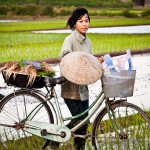On November 10, 9:30am - 11:00am, Agrilinks will host a webinar on the Feed the Future Gender-Sensitive Climate-Smart Agriculture for Nutrition (G-CAN) initiative and how it aims to support USAID on the new USAID Global Food Security Strategy. Specifically, G-CAN plans to achieve the following outputs: A framework for integrating gender and nutrition into climate >> Read more
Gender Seminar @ IFPRI: Self Employed Women’s Association (SEWA) and Climate Resilient Agriculture
Thursday, November 3, 2016, 2:00pm-3:00pm EST Presented by Ms. Reema Nanavaty, Director, Economic and Rural Development, Self Employed Women’s Association (SEWA), Ahmedabad, India Please join us virtually. GoToMeeting instructions provided below. Abstract: The Self Employed Women’s Association (SEWA) is a member based organization of poor self-employed women, with a membership of over 2 million across 15 states >> Read more
New IFPRI Discussion Paper: Using cognitive interviewing to improve the Women’s Empowerment in Agriculture Index survey instruments: Evidence from Bangladesh and Uganda
HAZEL J. MALAPIT, KATHRYN SPROULE, CHIARA KOVARIK This paper describes the cognitive interviews undertaken in Bangladesh and Uganda in 2014 as part of the second round of pilots intended to refine the original version of the Women’s Empowerment in Agricultural Index (WEAI). The WEAI is a survey-based tool that assesses gendered empowerment in agriculture. Baseline >> Read more
BLOGPOST: “As a wife I will help, manage, and love” The value of qualitative research in understanding land tenure and gender in Ghana
Reposted from the IFPRI Research Blog In this post I argue that qualitative field work aiming at understanding the local context is not a frivolous activity. For highly contested topics, such as gender and land, and in contexts where custom dominates, rigorous qualitative empirical work may lead to valuable insights and research outputs. The literature >> Read more
CALL FOR PAPERS: India, Gender & Food Security Papers
CALL FOR POLICY BRIEFS/SHORT PAPERS Open Window: 12 MAY 2016 – 27 MAY 2016 The India Food Security Portal,facilitated by IFPRI, is organizing a one day workshop on Gender and Food Security in India to be held on August 29 in New Delhi. As noted in a recent blog, women’s participation in food production often goes unrecorded but >> Read more
International Women’s Day 2016: Empowering women with data and evidence in Bangladesh
One of a researcher’s biggest fears is that research outputs go unread, gathering dust on people’s shelves before ending up in the recycling bin. However, this fear was unfounded for our work on the Women’s Empowerment in Agriculture Index (WEAI), which has gone from esoteric research tool to a widely-used data collection tool that has >> Read more
IFPRI Gender Methods Seminar: Good practices and lessons learned on gender and collective lands
Resource Equity with Landesa Presentation by Elisa Scalise and Renee Giovarelli, Co-founders of Resource Equity Chair: Agnes Quisumbing, Senior Research Fellow, IFPRI Poverty, Health, and Nutrition Division Discussant: Ruth Meinzen-Dick, Senior Research Fellow, IFPRI Environment and Production Technology Division Monday, March 14, 2016, 12:00pm-1:00pm Please find instructions for joining virtually at the end of this message. Synopsis of the >> Read more
Empowerment matters: “Invisible Women” in Niger produce less food
Fleur Wouterse has a new blog published on Agrilinks discussing recent research using the WEAI in Niger. Her takeaway messages include: Empowerment matters for agricultural production. Less empowered households experience lower returns to their labor and use their traction equipment and animals in a less effective manner. Women are much less empowered in so-called dual households where >> Read more
Blogpost: Gender research beyond fairy tales: we can still do more and better
Isabel Lambrecht, Associate Research Fellow at IFPRI’s office in Ghana, writes about her choice to investigate gender in agricultural technology adoption. In this blogpost for Economics that Matters, she shares some surprises from what she has learned asking the question central to her dissertation, do we get higher uptake of agricultural technologies if agricultural extension programs work with >> Read more
New publication: Gender, headship, and the life cycle: Landownership in four Asian countries
Originally posted on the CGIAR Research Program on Policies, Institutions, and Markets (PIM) blog Despite increasing evidence that households do not always function as one, policies regarding land and property rights are often formulated at the household level, assuming the primary adult male is the landowner. Because land policy reform has typically focused on changing household, rather >> Read more

